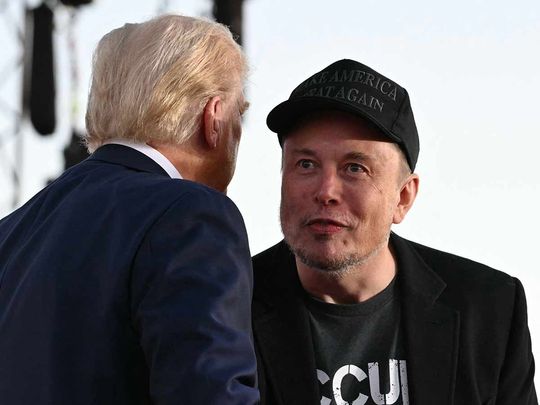


The biggest donor by far for the entire election cycle – Elon Musk – poured $75 million into the pro-Trump super political action committee he founded in the final weeks of the election, and continued to give an additional $45 million to America PAC after Trump had already declared victory, according to the latest Federal Election Commission data released late Thursday.
Musk, along with entrepreneur Vivek Ramaswamy, has been tapped to lead an effort to cut government spending, called the Department of Government Efficiency.
Several other donors who wrote big checks in the campaign’s closing stretch will also have a seat at the table in the new administration, if the Senate confirms their nominations. Cantor Fitzgerald LP’s Howard Lutnick, slated to be the Commerce secretary, gave almost $5 million to super PACs backing Trump. Intercontinental Exchange founder Jeffrey Sprecher, whose wife Kelly Loeffler has been tapped to head the Small Business Administration, gave $1 million. And Linda McMahon, chosen to lead the Education Department, also gave $1 million, according to FEC filings disclosing donations from mid-October to Election Day.
Trump’s picks for his cabinet – on track to be one of the wealthiest administrations in modern presidential history – demonstrate the role that campaign donations can play in accessing the president-elect’s political orbit. Trump, who rose to power in 2016 fueled by grassroots contributors giving in small increments, relied on billionaires for his third White House bid, showing a shift in how Republican mega-donors have embraced the president-elect as he has transitioned from party outsider to the GOP standard-bearer.
In his last days as a presidential candidate, Trump snagged other big donations for his campaign and party from billionaires including Robert W. Duggan of Summit Therapeutics and Thomas Dan Friedkin of the Friedkin Group. Billionaire Anthony Pratt gave $10 million to MAGA Inc., a super PAC supporting Trump.
Despite the billionaire support, Trump’s campaign raised only $477 million over the course of the election cycle, less than half the the $1.2 billion than Harris raised. But in the campaign’s final weeks, pro-Trump super PACs – which can accept unlimited donations – raised $260 million compared to $190 million for groups backing Harris, showing how deep-pocketed donors rushed to fund him as voters prepared to head to the polls.